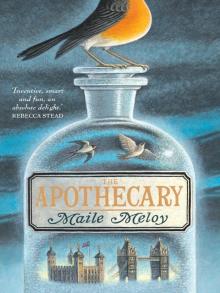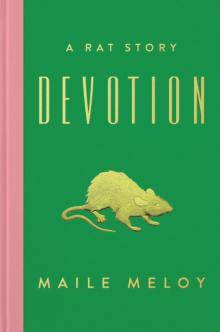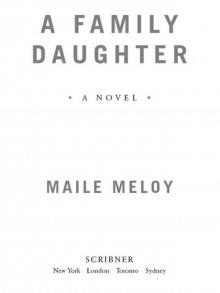- Home
- Maile Meloy
Do Not Become Alarmed
Do Not Become Alarmed Read online
RIVERHEAD BOOKS
An imprint of Penguin Random House LLC
375 Hudson Street
New York, New York 10014
Copyright © 2017 by Maile Meloy
Penguin supports copyright. Copyright fuels creativity, encourages diverse voices, promotes free speech, and creates a vibrant culture. Thank you for buying an authorized edition of this book and for complying with copyright laws by not reproducing, scanning, or distributing any part of it in any form without permission. You are supporting writers and allowing Penguin to continue to publish books for every reader.
Ebook ISBN: 9780735216549
Library of Congress Cataloging-in-Publication Data
Names: Meloy, Maile, author.
Title: Do not become alarmed : a novel / Maile Meloy.
Description: New York : Riverhead Books, 2017.
Identifiers: LCCN 2016051263 | ISBN 9780735216525 (hardback)
Subjects: LCSH: Domestic fiction. | BISAC: FICTION / Family Life. | FICTION / Coming of Age. | FICTION / Literary.
Classification: LCC PS3613.E46 D6 2017 | DDC 813/.6—dc23
LC record available at https://lccn.loc.gov/2016051263
p. cm.
This is a work of fiction. Names, characters, places, and incidents either are the product of the author’s imagination or are used fictitiously, and any resemblance to actual persons, living or dead, businesses, companies, events, or locales is entirely coincidental.
Version_1
For my parents
CONTENTS
Title Page
Copyright
Dedication
Epigraph
Chapter 1
Chapter 2
Chapter 3
Chapter 4
Chapter 5
Chapter 6
Chapter 7
Chapter 8
Chapter 9
Chapter 10
Chapter 11
Chapter 12
Chapter 13
Chapter 14
Chapter 15
Chapter 16
Chapter 17
Chapter 18
Chapter 19
Chapter 20
Chapter 21
Chapter 22
Chapter 23
Chapter 24
Chapter 25
Chapter 26
Chapter 27
Chapter 28
Chapter 29
Chapter 30
Chapter 31
Chapter 32
Chapter 33
Chapter 34
Chapter 35
Chapter 36
Chapter 37
Chapter 38
Chapter 39
Chapter 40
Chapter 41
Chapter 42
Chapter 43
Chapter 44
Chapter 45
Chapter 46
Chapter 47
Chapter 48
Chapter 49
Chapter 50
Chapter 51
Chapter 52
Chapter 53
Chapter 54
Chapter 55
Chapter 56
Chapter 57
Chapter 58
Chapter 59
Chapter 60
Chapter 61
Chapter 62
Chapter 63
Chapter 64
Chapter 65
Chapter 66
About the Author
Americans learn only from catastrophe and not from experience.
—THEODORE ROOSEVELT
It is a fact that it takes experience before one can realize what is a catastrophe and what is not.
—RICHARD HUGHES, A High Wind in Jamaica
1.
THE CRUISE SHIP towered over the dock in San Pedro like an enormous white layer cake, or a floating apartment building. The one thing it didn’t look like was an oceangoing vessel. Liv and her family surrendered their bags to porters and carried their backpacks into the terminal building. Her husband, Benjamin, was fascinated by the quay, built to get thousands of people onto fifteen-deck ships.
As they checked in, Liv filled out a form attesting that neither she nor her children had been sick in the last two weeks. It was a lie. Sebastian and Penny were eight and eleven, and it was December—they were walking germ vectors.
“You’re saying no illnesses, right?” her cousin Nora murmured beside her. Nora’s son, Marcus, was eleven like Penny, and they’d both had the same cold. Nora’s six-year-old, June, had a cough.
“Yes,” Liv whispered back.
They turned in the forms. Surely everyone lied and no one was fooled. An agent with bright green glasses took their passports for safekeeping, in exchange for plastic IDs to serve as cabin keys and charge cards.
Penny gazed at her own ID. “So I can buy things with this?”
“If your mom authorizes it,” the agent said.
“Authorize it!” Penny said, brandishing the card at Liv.
“What are you going to buy?” Liv asked.
“Things!”
Two pert young Australian women in white uniforms made them stop for a photograph in front of a life ring. Benjamin put his arm around Liv, with Penny and Sebastian in front of them. These were never satisfying pictures, the family photos. Liv was the same height as Benjamin and she felt herself slouch, even though it was ridiculous to care. The day was unseasonably warm, and she ran a hand up the damp back of her neck, feeling hot and flushed. She kept her hair cropped short so she could swim before work without losing time, but she was reminded by photos that her usually no-nonsense mother thought she should grow it out. Sebastian, blond like Liv, always looked a little wild-eyed in photos, the flash catching him by surprise. Penny had taken to striking poses, as if the world were her own red carpet.
They moved away and Raymond and Nora took their place in front of the life ring with Marcus and June. Liv watched. They were so handsome, Raymond with dark, smooth skin, Nora pale and brunette with a glossy ponytail, the kids tawny-limbed. They looked like an ad featuring a happy biracial family, one that would get horrible troll reactions online. Marcus was tall for eleven and had the beginnings of an Afro, and Junie wore tiny braids. Raymond had cut his hair close for a movie role as a cop.
“Is this the ‘before’ picture?” he asked, after the camera flashed.
“Something like that,” one of the Australians said, smiling. “But you look like the ‘after’ picture.”
Liv couldn’t tell if they had recognized Raymond. She thought not. “He always looks like the ‘after’ picture,” she said.
“I bet,” the girl said.
“Oh my God,” Nora said, as they moved on. “We’re not even on board and they’re flirting with him.”
They made their way among milling passengers, across a central court with a patterned marble floor. A giant Christmas tree rose up through three decks.
“Wow,” Sebastian breathed.
“It’s like The Nutcracker,” Penny said. “But real.”
They went up in a glass elevator, past the top of the tree, then down a blue-carpeted corridor. Liv and Nora had booked cabins next to each other, and Liv opened hers with the key card. There was a bottle of champagne and a bowl of fruit inside. The cabinets were pale wood, the bedcovers nautical navy and white. A couch in a little sitting area would pull out for the kids, so the cabin counted as a
“suite.” Mirrors made it all look bigger than it was, and the California sun glared bright through the balcony doors. Penny and Sebastian ran outside to look down.
“No going on the balcony unless an adult is here,” Liv said. “Deal?”
“Deal,” they sang in chorus. They ran back in to investigate the clever cupboards and the drawers that latched shut. Marcus and June arrived to compare notes.
“This is exactly backward from ours,” Marcus pronounced.
“That’s so weird,” June said, flopping back on the bed, braids bouncing. “I feel like I’m in mirror land!”
A voice came over the loudspeaker, right into the cabin, announcing the lifeboat drill.
“What’s that?” June asked.
Their stewardess put her head in the open door. Her name was Perla and she was tiny, her black hair parted in the middle. She showed them where to find the blocky orange foam life preservers in the closet, and pointed out their muster station on the ship’s plan.
“Do we have to get in the lifeboats?” Sebastian asked.
“No,” Perla said, laughing. “They only show you.”
The two families headed down the carpeted stairs, past crew members on the landings. In the muster station in the Yacht Club bar, a graceful young man with a microphone—a dancer?—explained the emergency procedure. All the other passengers seemed to be eighty. There were no other children. Penny and Sebastian feigned agonized drowning, and Junie skipped across the carpet. The old people smiled warily at them. Marcus sat beside his parents.
“I’m hungry,” Penny said. “This is taking too long.”
Liv smoothed Penny’s chestnut hair. Her child of appetite and opinion.
“I shouldn’t be thinking about Titanic, right?” Raymond said, clicking the buckle over his chest.
“Yes, you should,” Nora told him. “Think about how not to die if we sink.”
Benjamin said, “You know the orange life jackets and the lights are just for finding bodies.”
“I think that’s on airplanes,” Liv said.
“It’s unlikely that we’ll sink,” Marcus said.
“I know, babe,” Nora told her son. “We’re joking.”
The emergency signal sounded, and Marcus clapped his hands over his ears, digging his fingers into his curls.
“Sorry!” Nora said, pressing her hands over his. “It’ll be over soon.” Seven short blasts of the horn and one long one. Then they were released.
Liv checked the glucose monitor on Sebastian’s waistband. “Let’s go to the buffet.”
“It’s open?” Nora asked.
“It’s always open, I think.”
“I’ll go unpack,” Benjamin said, which meant he wanted a nap. Raymond wanted to check out the gym. The men carried everyone’s life jackets away.
On the walk to the buffet, Nora linked her arm through Liv’s and put her head on her shoulder, making Liv feel excessively tall. “I love you,” Nora said. “This was a genius idea.”
The children took trays and each got exactly what they wanted: Chinese noodles for Penny, chicken fingers for Sebastian, nori rolls for Marcus, taquitos for June. Watching them eat, Liv felt her mind relax, easing its calculation. Feeding children, even when you had all available resources, took so much planning and forethought. The low-grade anxiety about the next meal started when you were cleaning up the last. But for two weeks there would never be any question about what was for dinner, or lunch, or snack. That roving hunter-gatherer part of her brain, which sucked a lot of power and made the other lights dim—she could just turn it off.
The trip had been Liv’s idea. Nora’s mother died of pancreatic cancer in early summer: swift and painful. After the death, Nora had been flattened by waves of sadness, sobbing jags where she couldn’t breathe or speak. Her mother had been problematic, borderline, sometimes absent. When they were eight, she’d sent Nora to live with Liv’s family, because her new husband didn’t want children around. The cousins had shared a bedroom for two years, until the new marriage failed and the prodigal mother came back. Nora had always been wry about her mother’s flakiness, and trenchant about motherhood in general. No one had predicted that the loss would hit her so hard.
Nora had called Liv in October in despair about Christmas plans. She didn’t want to go to Philadelphia to stay with Raymond’s parents when she felt like such a mess. She didn’t want to be with Liv’s parents, the adoptive family of her abandoned childhood. And she didn’t want to be home in LA, where the clear blue skies and the empty freeways would make her feel even more isolated and exposed. She wanted to be with family but not with family. She wanted to have Christmas but not have it feel like Christmas.
Liv was pragmatic, a problem-solver. She got it from her mother, a flinty Colorado litigator. She believed in finding a third way, when the options seemed intolerable, and she believed in throwing money at problems, when it was possible. She found a two-week cruise down the coast of Mexico and Central America, poking into the Panama Canal long enough to watch the locks work—bait for her engineer husband—and then heading north to LA again. It would be just the two families, Liv and Nora and their husbands and kids. They wouldn’t have to fly, they could board in San Pedro. Raymond was between movies, and Liv’s office was deserted over Christmas. Benjamin could make his own schedule as long as he kept pace on his projects. They could all take Nora away.
“You always said cruises were tacky,” Benjamin said when Liv suggested it.
“They are,” she said.
“And an environmental nightmare.”
“That’s why it’s such a good idea,” she said. “My parents won’t want to go because of fossil fuels and norovirus. Your parents want to go to Cuba. So no hurt feelings. It will be just us, and it will be different. It’s just what Nora wants.”
“And the fossil fuels?”
She felt a little shudder of guilt. “The ship is going anyway?”
Benjamin said yes, and Liv called Nora, who started to cry again, and then they went online to look at cabins.
The kids would have each other to play with, their second cousins. When Nora had been crying on Liv’s couch over the summer, she was also worrying about Marcus. At five he’d known every country and every capital in the world. (Penny, at the same age, had known Colorado, Disneyland, and Santa Monica, where her modern dance class was.) Certain things, like the emergency horn, were intolerable to Marcus, but he didn’t meet all the parameters for a diagnosis. Nora had been looking for a school that would understand her son’s strengths and his difficulties. Raymond wanted one where there might be other black kids. Liv had talked them into trying Penny and Sebastian’s school. It was small, progressive, and at least working on diversity. Their late application was accepted, and Marcus seemed happy there. His teacher created a special geography project for him, and let him read what he wanted.
So now Penny and Marcus were in sixth grade at the same school, and they would grow up together almost as their mothers had. For most of history, the two sets of children would have been betrothed to each other from birth, and Liv would have been happy with that. Sebastian and June adored each other like two puppies, even though June was younger. Sebastian, sweet-tempered and pliable, could grow up and be drawn in by some damaged girl who would blame him for her pain. Liv would have loved to promise him to funny, curious June, and seal it now.
At the buffet table, Nora studied the ship’s schedule. There was an evening movie in the Kids’ Club, one of the Madagascar sequels. The ship started to move, and the children ran out on deck and leaned on the varnished honey-colored rail. The bow thrusters churned the blue water white against the dock. Liv hoped Benjamin was watching from the balcony. It was majestic, the stately movement out of San Pedro, the lacy trail of wake behind them, the tiny boats below.
When they were out to sea and had explored the ship—skirting the cl
anging casino and gaping at the terrible paintings for sale, of martinis and cars—the kids settled in to watch the movie. The chaperones seemed reasonably sane. A New Zealander named Deb promised to sit near Sebastian in case his monitor went off, and Liv and Nora went to change for a grown-up dinner.
When she got back to the cabin, Benjamin was stretched out on top of the bedcovers, waking up from his nap. “Wait, so we can just shunt them off to the Kids’ Club?” he asked.
“Good, right?”
“And they’re fine with it?”
“They’re watching animated animals. They don’t love us that much.”
“Oh my God,” Benjamin said, rubbing his hands in his hair. “This is amazing.”
“Did you see the bow thrusters as we left?”
“Not if they weren’t on the backs of my eyelids.”
Liv showered and put on a cotton dress, and Benjamin took her place in the bathroom. The panoptic mirrors in the cabin left no secrets, and she wished she were thinner, and then wished she didn’t wish that. Her hair was looking a little straw-like these days. She tucked the short strands behind her ears.
At dinner, Raymond ordered champagne from the Russian wine steward. “To Liv,” he said, “for the best idea since Velcro kids’ shoes.”
Liv made a demurring noise but held her glass up anyway.
“And for generally running my life much better than I do,” Nora said.
Liv smiled. “Not everyone will let me run theirs.”
She had introduced Nora to Raymond. He’d played a marine lieutenant in the first movie Liv ever developed, and was nominated for an Image Award from the NAACP. Liv had invited Nora to the party and loaned her a dress. Nora wore her hair up in a dark sweep, and on her narrow shoulders the neckline of the dress hung fetchingly low. She had a heart-shaped, Quakerish face, and an adorable smallness that made Liv feel like a Norwegian giantess, especially in heels. As the three of them stood at a cocktail table eating passed appetizers, Raymond had turned to Nora with the full light of his dazzling actor handsomeness, and Liv had realized she was superfluous and gone off to get a drink.
The Russian wine steward brought them a bottle of rosé as soon as they finished the champagne. His name tag said YURI. “You were that astronaut in that movie,” he said, pouring the first taste for Raymond.

 The Apothecary
The Apothecary Both Ways Is the Only Way I Want It
Both Ways Is the Only Way I Want It Do Not Become Alarmed
Do Not Become Alarmed Devotion: A Rat Story
Devotion: A Rat Story A Family Daughter
A Family Daughter